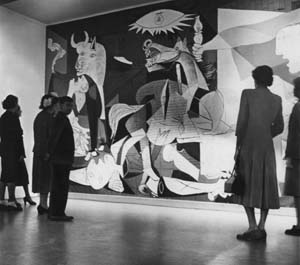 Simon Schama is the presenter of the television series: “The Power of Art“, which runs for eight weeks on BBC 2 on Fridays. The Professor in art and art history at Columbia University in New York City narrates the documentaries using beautiful and descriptive language as well as creative and artistic form and style. He uses his impressive in depth-knowledge to feature the artists, their biography, the motivation to and the development of their work.
Simon Schama is the presenter of the television series: “The Power of Art“, which runs for eight weeks on BBC 2 on Fridays. The Professor in art and art history at Columbia University in New York City narrates the documentaries using beautiful and descriptive language as well as creative and artistic form and style. He uses his impressive in depth-knowledge to feature the artists, their biography, the motivation to and the development of their work.
Last Friday’s episode was the seventh in the series and focused on the emergence of Pablo Picasso’s political art piece “Guernica”. The title “The Power of Art“ does unfortunately not refer to the influence of art on politics or society in general, but to the immediate impact on the individual viewer.
So the question the presenter asks at the beginning of the film: “What can art really do in the fall of an atrocity?” is answered at the end disappointingly with that it could _“share the heritage of appalled humanity at the suffering of civilians in every conflict.”
_
There is a slight feeling of betrayal still left after viewing the one-hour documentary the title of the series does not accurately, but sensationally describe the content of the film. The BBC funded movie is rather a conventional explanation in disguise than following the advertised and expected new approach presenting psychological and political results.
The broadcast consists out of a biography of the artist, historical footage, pictures of partners, references to the influence of other contemporary and classical, and the explanation of the used symbolism.
Astonishing was the revelation, that Salvador Dali sided with the conservatives and the fascists, whereas Pablo Picasso avoided taking sides till 1937. He then draw the comic strip “Dream and Lie of Franco” to raise funds for the refugees of the Spanish Civil war and later became the anarcho-communist “Hero artist of the Republic”.
The documentary ends with the tale of the cover-up of the “Guernica” reproduction in the United Nations building in February 2003 when the American case to intervene in Iraq was heard. Whilst the documentary series is well made in regards to the historical and the artistic angle, power and politics are not examined at all. The BBC website reflects this approach. Surprisingly enough the Internet presentation also includes interviews with contemporary artists, such as an alternative tour through London with communist artist Stewart Home, though similarities in political attitude compared with Pablo Picasso are not touched on and might be totally coincidental.